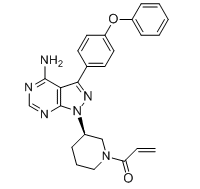All AbMole products are for research use only, cannot be used for human consumption.

PCI-32765, a selective, irreversible Btk inhibitor, is a novel, molecularly targeted agent for patients with B-cell malignancies, and is particularly active in patients with CLL. B-cell receptor (BCR) signaling is a critical pathway in the pathogenesis of several B-cell malignancies, including chronic lymphocytic leukemia (CLL), and can be targeted by inhibitors of BCR-associated kinases, such as Bruton tyrosine kinase (Btk). PCI-32765 significantly inhibited CLL cell survival, DNA synthesis, and migration in response to tissue homing chemokines (CXCL12, CXCL13). PCI-32765 also down-regulated secretion of BCR-dependent chemokines (CCL3, CCL4) by the CLL cells, both in vitro and in vivo. In an adoptive transfer TCL1 mouse model of CLL, PCI-32765 affected disease progression. In this model, PCI-32765 caused a transient early lymphocytosis, and profoundly inhibited CLL progression, as assessed by weight, development, and extent of hepatospenomegaly, and survival. Inhibition of BTK by PCI-32765 overcomes BCR- and chemokine-controlled integrin-mediated retention and homing of malignant B cells in their growth- and survival-supporting lymph node and bone marrow microenvironment, which results in clinically evident CLL regression.

Int Immunopharmacol. 2022 Dec;113(Pt B):109469.
Ibrutinib suppresses the activation of neutrophils and macrophages and exerts therapeutic effect on acute peritonitis induced by zymosan
PCI-32765 purchased from AbMole

BMC Biol. 2021 May 20;19(1):108.
Very long intergenic non-coding (vlinc) RNAs directly regulate multiple genes in cis and trans
PCI-32765 purchased from AbMole

J Virol. 2020 Feb 14;94(5):e01791-19.
Targeting Kaposi's Sarcoma-Associated Herpesvirus ORF21 Tyrosine Kinase and Viral Lytic Reactivation by Tyrosine Kinase Inhibitors Approved for Clinical Use
PCI-32765 purchased from AbMole
| Cell Experiment | |
|---|---|
| Cell lines | osteoblast cells |
| Preparation method | In vitro osteoblast differentiation Cells derived from calvaria were cultured in an osteogenic medium (50 μM ascorbic acid, 10 nM dexamethasone and 10 mM β- glycerophosphate) in the presence of ibrutinib and subjected to an analysis of the activity of alkaline phosphatase (after 7 days) and bone nodule formation (after 21 days). |
| Concentrations | 0~100nM |
| Incubation time | 7days |
| Animal Experiment | |
|---|---|
| Animal models | RANKL-induced bone loss in mice |
| Formulation | saline |
| Dosages | 6.25, 12.5 or 25 mg/kg 1 h before the first GST-RANKL injection |
| Administration | oral gavage |
| Molecular Weight | 440.5 |
| Formula | C25H24N6O2 |
| CAS Number | 936563-96-1 |
| Solubility (25°C) | DMSO ≥30 mg/mL |
| Storage | 2-8°C, protect from light, dry, sealed |
| Related BTK Products |
|---|
| BIIB129
BIIB129 is a covalent, selective inhibitor of Bruton's tyrosine kinase (BTK) capable of penetrating the blood-brain barrier. BIIB129 inhibits the activity of BTK by covalently binding to Cys481 in BTK, thereby affecting the function of B cells and myeloid cells. |
| UBX-382
UBX-382 is an orally available proteolysis-targeting chimeras (PROTACs) that target BTK to inactivate B-cell receptor signaling. |
| GDC-0834
GDC-0834 is a potent and selective BTK inhibitor. |
| DD-03-171
DD-03-171 is a BTK, IKFZ1 and IKFZ3 degrader, the BTK IC50 a value of 5.1 nM. |
| N-piperidine Ibrutinib hydrochloride
N-piperidine Ibrutinib hydrochloride is a reversible Ibrutinib derivative. |
All AbMole products are for research use only, cannot be used for human consumption or veterinary use. We do not provide products or services to individuals. Please comply with the intended use and do not use AbMole products for any other purpose.


Products are for research use only. Not for human use. We do not sell to patients.
© Copyright 2010-2024 AbMole BioScience. All Rights Reserved.
